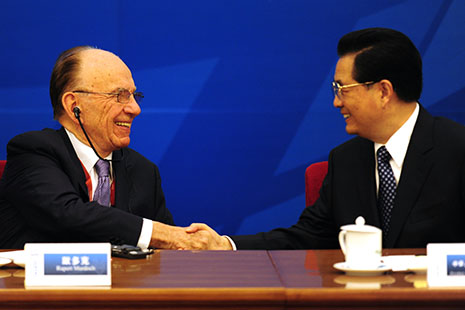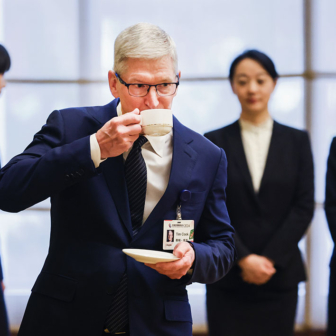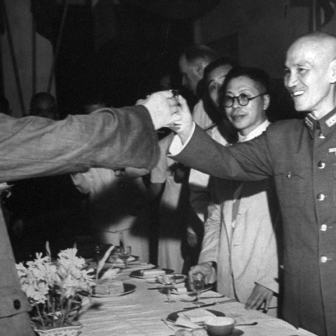SOME OF THE world’s leading media organisations have just spent three days at a “world media summit” in Beijing. Mr Rupert Murdoch was a co-chair and speaker, and the Australian gave the summit detailed coverage, including a large photograph showing summiteers beneath a banner emblazoned “Cooperation. Action. Win-win. Development.”
The words “Truth,” “Freedom” and “Independence” were not on the banner and, judging by the Australian’s report, barely rated a mention at the summit, although the paper’s correspondent, to his credit, managed a reference to “China’s tightly controlled and censored media sector in which journalists are regularly jailed for not toeing the party line.”
There is, of course, no mystery about why western media moguls, all princes of free-market capitalism and dedicated to possessive individualism, rushed to Beijing to kow-tow at a Communist Party event sponsored and controlled b y China’s state-run propaganda arm, the Xinhua news agency. For these moguls, suffering hard times as their profits are buffeted by economic contraction and new media technologies, China is a Business Opportunity. Big B. Big O. They want access to that market of 1.3 billion people in the world’s biggest and fastest-rising economy. They want cooperation, action and win-win partnerships and they are willing to do whatever it takes to get them.
So there was no discussion at this world media summit of the role of the media as a public trust, a gad-fly, a critic that shines a sometimes inconvenient and embarrassing light on the actions of governments and their agents. There was no discussion about the importance of striving for truth, accuracy, independence and freedom from crushing state censorship and defamation laws. According to Eric Morrison, president of the Canadian Press news agency, quoted in the Australian, the summit reflected on how wonderful it was to have a lot of “good partnerships.” (Students enrolled in Weasel Words 101 can draft a definition of what Mr Morrison means by “good partnerships.”)
Rupert Murdoch’s contribution to the summit was that of a mogul on the make. His big ideas were that China should move to take advantage of emerging digital technologies to expand the influence and revenues of its media, embrace more domestic media competition, and charge for internet access. Having lost heavily on earlier bids to gain a toehold in the Chinese media, Mr Murdoch did not float any of the libertarian notions that dominate the editorial agendas of his western publications, including the Wall Street Journal, whose editor accompanied him to Beijing.
Mr Murdoch grovelled instead, even telling his hosts that they should not take criticism personally as he gingerly mentioned the copyright piracy for which China is notorious. If the words “Uighur,” “Tibet,” “Dalai Lama” and “Stern Hu” passed the lips of this fearless publisher or of any other summiteer, the Australian did not see fit to report them. Nor apparently did anyone see fit to mention the remarkable contradiction between China’s sixtieth anniversary military display and its claim to be a warm and friendly and benign power.
But perhaps the most extraordinary remarks at the summit were made by the Chinese president Hu Jintao, whose appearance was said to be “a surprise.” (A surprise to whom?) Even more extraordinarily, Mr Hu’s remarks were greeted with attentive respect. He pledged to “continue to make government affairs public, enhance information distribution, safeguard the legitimate rights and interests of foreign news organisations and reporters, and facilitate foreign media coverage of China in accordance with China’s laws and regulations.”
Some observations. First, Chinese government affairs have never been public. They are announced by official spokesmen and questions are simply stonewalled. Second, the Chinese government exercises total control over all domestic media and censors the internet aggressively. Third, any political dissidence not approved by the government (and it has approved mob attacks on Japanese property) results in the swift imprisonment of offenders.
Some questions. First, what are the “legitimate rights and interests” of foreign news organisations in China? Who defines them and who enforces them? Second, which laws and regulations in China facilitate foreign media coverage? (Students of Hypocrisy 202 are invited to answer. Hint: the words “none” and “the Party” will be part of any adequate answer which should reflect also on how much nonsense you can get away with if you are the leader of rising authoritarian state.)
There are reasons to be uneasy about the appearance of around 170 world media organisations at the Beijing summit. As the economic strength of these organisations declines, they seem almost indecently willing to dance with a dictatorship in a misguided bid to secure their futures. To do so they have to be ready to jettison what should be their most defining and abiding principles.
If the journalistic practice of the Xinhua news agency, the summit sponsor, becomes the model for western media partnerships in China, the world will be denied objective, informative and independent news, analysis and commentary on China. It will get government propaganda, pure and simple, the approved and anodyne drivel preferred by President Hu.
If Mr Morrison thinks that outcome would be “wonderful,” he has a curious understanding of wonderful. And if Mr Murdoch thinks that anybody is likely to pay good money for internet access to Xinhua propaganda, he is deluded. Or perhaps Messrs Morrison and Murdoch, faced with the choice between democracy and the market, are just opting for the market. •




